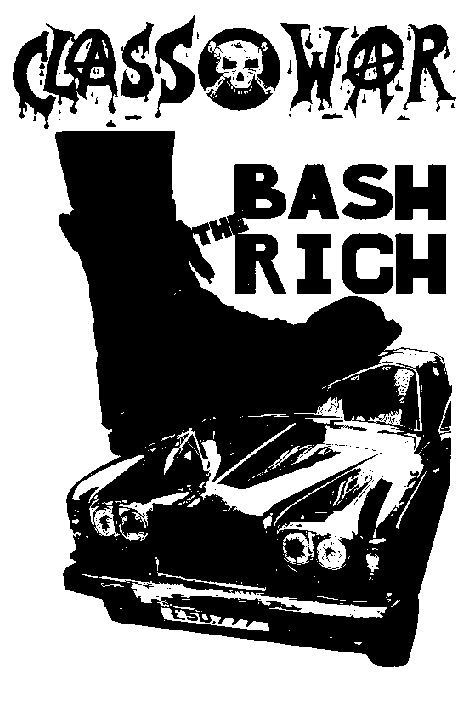I’m half-way through a new book by one of the founders of Class War. It’s pretty un-fucking-putdownable (see, it’s already having an impact on the way I write), mainly cos it captures that whole sense of potential that existed in the mid to late 1980s. Some of this might be pure nostalgia, but it was a pretty mad time. And one of the things that was mad about it was the seamless way struggles flitted back and forth without any of the sniping or prejudice that set in later. There didn’t seem to be any outright contradiction between any of these struggles – anarcho-punk squatters, anarcha-feminist peace campers, animal rights activists, striking miners, wannabe rioters etc. Sure there was loads of tension, some of it pretty aggressive and intense, but all of it was productive. Resonance produced movement: we seemed to be going somewhere (probably related to the fact that we were often literally going somewhere: demos, marches, Stonehenge, Henley…).
OK, one of the simplistic counter-arguments to this is that we were young, and everything seemed possible – it’s that feeling you get as you lie in the grass on a summer’s day and stare up into the sky. A slightly more sophisticated response points to the importance of dole culture. Both points are pretty valid. And there’s also a sense that getting older is, as much as anything, a process of accretion – things stick to you (jobs, homes, families…). We slow down.
But I’m trying to fit this in with the stuff we’ve been thinking about recently, especially the relation between the intensive and the extensive. It seems to make sense. Part of the madness about Class War then was that it was immeasurable. Literally. Groups were springing up all over the place calling themselves ‘Xxxx Class War’. And this whirlwind was making the intensive field visible. A bit like throwing flour onto a kitchen surface so you can see where the mice are going. The process is nothing new. It’s exactly the same as punk, or the Paris Commune or blah blah blah. I like to think that the ‘Behold Your Future Executioners’ banner had some small print somewhere which read ‘Behold the Unruhe’. Compare that to the bureaucratic machine of the Class War Federation with its delegate meetings and conference proposals…
Of course it’s easy to drift into thinking that intensive=good and extensive=bad, or that it should be a one-way relationship. Cold water in the face brings you back to this awful place… But this awful place is where we are. The intensive might be the realm of change but that change happens in the real, which involves the extensive. So Bone’s book has made me think again about ‘stuntism’, as way of trying to direct the movement from extensive to intensive, i.e. trying to use the normal mechanisms of capture (especially the media) to re-open the field of possibilities. Which was a pretty fucking cute tactic – just so long as you don’t call it a dialectic, OK?
And if you really want to get down-and-dirty philosophical, this caught my eye:
‘Thesis of Ontological Excess’: Being is more than one and prior to one. The preindividual is in excess of its actual individual expressions. Being is ‘problematic’ (or differential) and individuals are only ever temporary resolutions of these tensions; tensions that continue to subsist even after actualization. This thesis of excess is thus counter to any ontology based on lack.
I don’t claim to understand the finer points of it, does it fit in with relation between extensive and intensive?
I’ll stop here cos I’m rambling (something else to do with age).


5 Comments